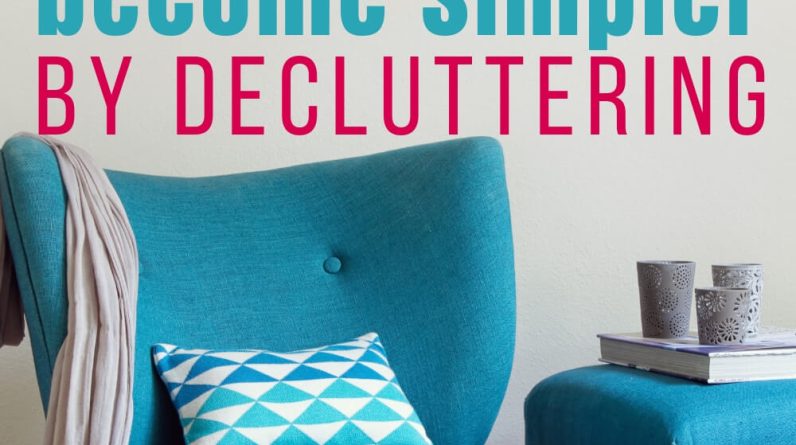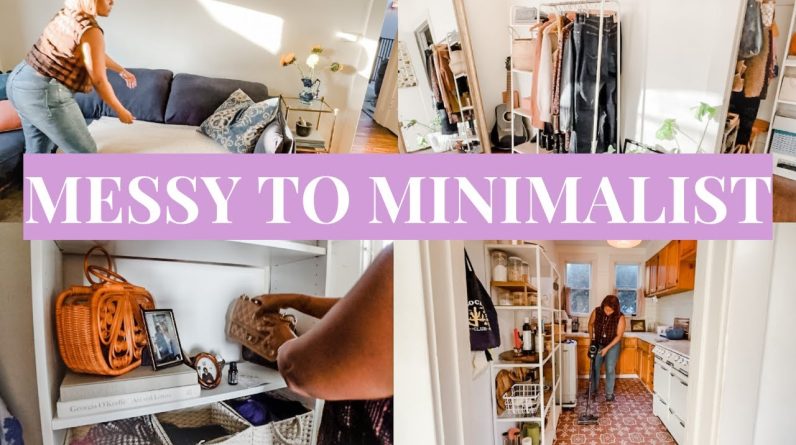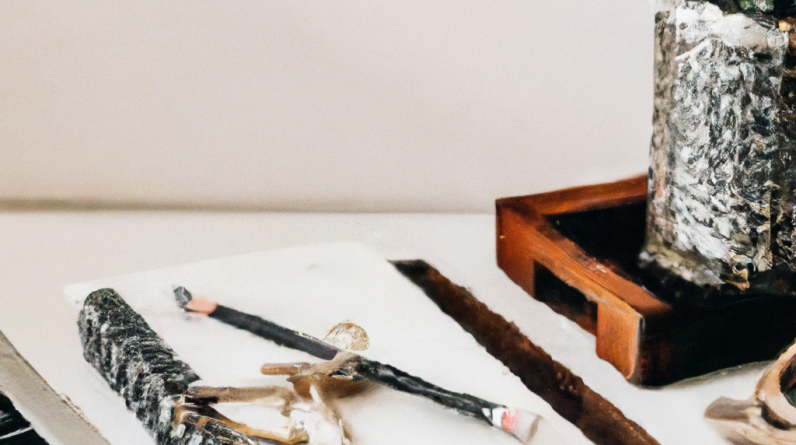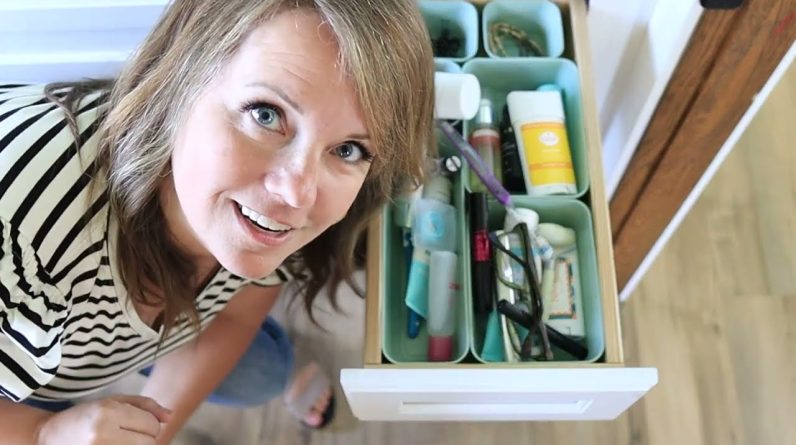
Imagine a life where you are surrounded by only the things that truly bring you joy and fulfilment, where your living space is clean, spacious, and clutter-free. In a world that is often overwhelming and busy, decluttering and simplifying your life can offer a sense of calm and clarity. With a focus on minimalism, this article explores the benefits of decluttering, organizing, and streamlining your surroundings. By embracing the philosophy of “less is best,” you can create a space that nurtures your well-being and allows you to focus on what truly matters. So, let’s embark on this journey together and discover how decluttering can transform not only your physical environment but also your mindset and overall quality of life.
Table of Contents
Why Decluttering is Important
Decluttering is more than just tidying up your physical space. It is about simplifying and organizing your life in order to create a sense of calm and clarity. By reducing the amount of physical and digital clutter, you can alleviate stress, improve focus and productivity, and create more space for the things that truly matter. In this article, we will explore the various reasons why decluttering is important, along with practical steps and tips to help you declutter your home, digital life, daily routines, workspace, and ultimately, find emotional freedom through decluttering.

This image is property of Amazon.com.
Reducing Stress and Anxiety
One of the key benefits of decluttering is the reduction of stress and anxiety. Cluttered spaces can feel overwhelming and chaotic, which in turn affects your mental well-being. By decluttering and organizing your physical and digital spaces, you create a sense of order and simplicity that promotes peace of mind. When your environment is clutter-free, you are able to think more clearly and feel a greater sense of calmness, leading to reduced levels of stress and anxiety in your daily life.
Creating More Physical Space
Decluttering allows you to create more physical space in your home, which can have a profound impact on your overall well-being. By getting rid of items that you no longer need or use, you are able to make room for the things that truly matter to you. Whether it’s clearing out your closets, drawers, or storage areas, having a clutter-free living space creates a sense of openness and freedom. It also offers the opportunity to breathe new life into your surroundings by rearranging furniture or introducing decorative elements that bring you joy.
Improving Focus and Productivity
Living in a clutter-free environment can significantly improve your focus and productivity. When your physical space is organized and free from distractions, you are able to concentrate better on the task at hand. Similarly, decluttering your digital life, such as organizing files and folders on your computer or limiting social media usage, can help you stay focused and avoid unnecessary distractions. By decluttering both your physical and digital spaces, you are creating an environment that supports and enhances your ability to concentrate and be productive.
Steps to Decluttering Your Home
Decluttering your home may seem like a daunting task, but by breaking it down into manageable steps, you can achieve a clutter-free living space. Here are some steps to help you get started:
Set Clear Goals
Before you begin decluttering, it’s important to set clear goals for yourself. Decide what areas of your home you want to tackle first and establish a timeline for completing each task. Setting goals will give you a sense of direction and motivation throughout the decluttering process.
Start Small
When you first start decluttering, it’s best to start with small areas or specific categories of items. This could be a specific drawer, a closet, or even just one room. By starting small, you can ease into the decluttering process without feeling overwhelmed. As you gain momentum and see the progress you’re making, you can gradually move on to larger areas.
Sort and Categorize
As you declutter, sort your items into categories. For example, create piles for things to keep, donate, sell, or discard. This will help you stay organized and make decisions more efficiently. As you go through each item, ask yourself if it brings you joy or serves a practical purpose in your life. If the answer is no, it may be time to let go of that item.
Make Decisions Quickly
When decluttering, it’s important to make decisions quickly. Dwelling on whether or not to keep an item can lead to decision fatigue and slow down the decluttering process. Trust your instincts and make a decision in the moment. If you find it difficult to let go of certain items, remind yourself of the benefits of decluttering and the space it will create in your life.
Find Storage Solutions
Once you have decluttered your home, it’s important to find appropriate storage solutions for the items you have chosen to keep. Invest in storage containers, shelves, or baskets to help keep your belongings organized and easily accessible. Having designated storage spaces for different categories of items will prevent clutter from building up again in the future.

This image is property of www.fillingthejars.com.
Decluttering Your Digital Life
In today’s digital age, it’s not just our physical spaces that can become cluttered; our digital lives can also be filled with unnecessary distractions. Here are some tips for decluttering your digital life:
Organizing Files and Folders
Start by organizing your digital files and folders on your computer or other devices. Create a logical system of folders and subfolders to categorize your documents, photos, and other files. This will make it easier to find what you need and eliminate the clutter on your desktop or in your file explorer.
Limiting Social Media Usage
Social media can easily become a source of clutter in our lives. Consider limiting your social media usage by unfollowing accounts that do not bring you value or joy. Reduce the number of platforms you use and set specific time limits for yourself each day. By decluttering your social media feeds, you can create a more intentional and focused online experience.
Unsubscribing from Email Lists
Another source of digital clutter is our email inboxes. Take the time to unsubscribe from email lists that no longer serve you or contribute to your goals. Clear out your inbox by deleting unnecessary emails and creating folders for important messages. Implementing an email management system, such as regularly archiving or deleting old emails, can help keep your inbox clutter-free in the long run.
Clearing Digital Clutter
In addition to organizing files and decluttering social media and email, it’s important to clear out other forms of digital clutter as well. Delete unused apps from your devices, remove bookmarks that you no longer use, and organize your digital photos and music libraries. By decluttering your digital life, you can create a more streamlined and focused online experience.
Simplifying Daily Routines
Incorporating simplicity into your daily routines can help reduce stress and create a more efficient and balanced lifestyle. Here are some ways to simplify your daily routines:
Streamlining Your Morning Routine
Start your day off on the right foot by streamlining your morning routine. Plan and prepare for the day ahead the night before. Lay out your clothes, pack your bag, and have breakfast options readily available. By doing these tasks ahead of time, you can eliminate decision-making stress in the morning and start your day with a clear mind.
Creating Meal Plans
Meal planning can save you time and reduce the stress of deciding what to eat each day. Set aside time each week to plan out your meals, create a grocery list, and prep ingredients in advance. Having a structured meal plan not only simplifies your daily routine but also helps you make healthier food choices and save money by reducing food waste.
Establishing Regular Cleaning Schedules
A clutter-free life goes hand in hand with a clean and organized living space. Establishing regular cleaning schedules can help you maintain a clutter-free environment. Create a weekly and monthly cleaning checklist and divide tasks among family members or roommates. By spreading out the cleaning responsibilities, you can maintain a clean and organized home without feeling overwhelmed.
Automating and Outsourcing Tasks
Identify tasks in your daily routines that can be automated or outsourced. For example, set up automatic bill payments or subscription renewals to avoid late fees and paperwork clutter. Consider delegating certain tasks to others, such as hiring a cleaning service or using grocery or meal delivery services. Simplifying your daily routines by automating or outsourcing tasks frees up time and mental energy for more meaningful pursuits.

This image is property of www.50shadesofage.com.
Adopting Minimalist Habits
Minimalism is not just about decluttering your physical and digital spaces, but also about adopting a mindset and lifestyle that values quality over quantity. Here are some minimalist habits you can incorporate into your life:
Embracing Essentialism
Embrace the concept of essentialism by focusing on what truly adds value to your life. Prioritize experiences and relationships over material possessions. Learn to say no to commitments and activities that do not align with your values or bring you joy. By focusing on the essentials, you can declutter not only your physical space but also your mind and schedule.
Practicing Mindfulness
Mindfulness is a key aspect of living a minimalist lifestyle. By practicing mindfulness, you become more aware of your thoughts, actions, and surroundings. This heightened awareness helps you make intentional choices and avoid mindless consumption or accumulation of unnecessary items. Mindfulness also cultivates a sense of gratitude, allowing you to appreciate the things you have and let go of attachments to material possessions.
Avoiding Impulse Buying
A common pitfall in our consumer-driven society is impulse buying. Before making a purchase, ask yourself if the item is truly necessary and aligns with your values. Consider implementing a waiting period before buying non-essential items to avoid impulsive decisions. By being mindful of your purchasing habits, you can avoid cluttering your space with items that do not bring you long-term joy or serve a practical purpose.
Letting Go of Sentimental Items
One of the most challenging aspects of decluttering is letting go of sentimental items. While it is natural to attach memories and emotions to physical objects, it is important to differentiate between items that truly hold significance and those that are merely symbols of the past. Consider taking photos or creating digital albums of sentimental items to preserve the memories without the physical clutter. By letting go of sentimental items that no longer serve you, you create space for new experiences and memories.
The Benefits of Minimalism
Adopting a minimalist lifestyle offers numerous benefits beyond a clutter-free living space. Here are some of the benefits of minimalism:
Increased Clarity and Focus
By simplifying your life and decluttering your physical and digital spaces, you experience increased clarity and focus. Removing distractions and unnecessary clutter allows you to concentrate on what truly matters to you, whether it’s your work, relationships, or personal growth. As a result, you can make more intentional choices and pursue your goals with greater clarity and focus.
More Time and Freedom
Minimalism allows you to regain control of your time and experience a greater sense of freedom. By decluttering your physical and digital spaces, simplifying your daily routines, and adopting minimalist habits, you free up time for activities that bring you joy and fulfillment. Instead of spending countless hours organizing or managing your belongings, you can devote your time to hobbies, self-care, spending time with loved ones, or pursuing new opportunities.
Saving Money
Living a minimalist lifestyle can lead to significant financial savings. By reducing the desire for unnecessary material possessions, impulse buying, and excessive consumption, you can save money and redirect your resources towards experiences, investments, or long-term goals. Additionally, decluttering and organizing your belongings can help you identify what you truly need, preventing you from purchasing duplicate or unnecessary items in the future.
Reduced Environmental Impact
Minimalism aligns with sustainable living practices, which can contribute to a reduced environmental impact. By consuming less, minimizing waste, and being mindful of your purchasing habits, you can play a part in preserving natural resources, reducing pollution, and minimizing the overall ecological footprint. Transitioning to a minimalist lifestyle allows you to be more conscious of your environmental impact and make choices that promote a more sustainable future.

This image is property of Amazon.com.
Decluttering Your Workspace
A cluttered workspace can hinder productivity and creativity. Here are some steps to help you declutter your workspace:
Eliminating Clutter on Your Desk
Start by decluttering your physical desk space. Remove any items that are not essential to your work or do not bring you joy. Create a designated space for important documents and supplies, and keep surfaces clear of unnecessary clutter. Consider implementing an organization system, such as using trays or file holders, to keep your desk tidy and functional.
Organizing Digital Files and Documents
Decluttering your digital workspace is just as important as decluttering your physical workspace. Organize your digital files and documents into clearly labeled folders to make it easier to locate and access the files you need. Delete outdated or unnecessary files, and create shortcuts or bookmarks for frequently used documents or websites. A clean and organized digital workspace promotes efficiency and reduces stress.
Creating a System for Paperwork
If your work involves handling paperwork, it’s crucial to have a system in place to manage it effectively. Implement a filing system that suits your needs, whether it’s using physical folders, digital folders, or a combination of both. Sort and categorize your paperwork into different folders based on priority or topic. Regularly review and purge outdated or irrelevant documents to maintain a clutter-free workspace.
Maintaining a Clutter-Free Life
Once you have decluttered your physical and digital spaces, it is important to maintain a clutter-free life. Here are some tips to help you maintain a clutter-free environment:
Regular Cleaning and Purging
Make a habit of regularly cleaning and purging your living and workspace. Set aside dedicated time each week or month to declutter and organize. Clean out your closets, drawers, and storage areas, and discard or donate items you no longer need or use. By incorporating these maintenance activities into your routine, you can prevent clutter from accumulating and maintain a clutter-free environment.
Avoiding Accumulating Unnecessary Items
Be mindful of your purchasing habits and avoid accumulating unnecessary items. Before making a purchase, ask yourself if the item aligns with your values and brings you joy or serves a practical purpose. Consider borrowing or renting items instead of buying them if they will only be used temporarily. By practicing mindful consumption, you can prevent clutter from building up in your life.
Applying the ‘One In, One Out’ Rule
A simple rule of thumb for maintaining a clutter-free life is the ‘One In, One Out’ rule. Whenever you bring a new item into your home or workspace, discard or donate an existing item. This practice ensures that the number of items you own remains relatively constant, preventing clutter from accumulating over time. By consciously considering the space and utility of each new item, you can maintain a balanced and clutter-free environment.

This image is property of Amazon.com.
Finding Emotional Freedom through Decluttering
Decluttering can provide not only physical and mental benefits but also emotional freedom. Here are some ways in which decluttering can help you find emotional freedom:
Letting Go of Emotional Baggage
Physical clutter often represents emotional clutter as well. By decluttering and letting go of physical items that hold emotional attachments or negative memories, you can release emotional baggage and create space for new experiences and positive emotions. Reflect on the emotions associated with certain items and consider whether they contribute to your happiness and well-being. Letting go can be liberating and allow you to move forward with a lighter heart.
Creating a Calm and Serene Environment
A cluttered living space can contribute to feelings of stress, overwhelm, and emotional unrest. By creating a calm and serene environment through decluttering, you set the stage for emotional well-being. Surround yourself with items and decor that bring you joy and a sense of peace. Design your space in a way that supports relaxation, reflection, and positive energy. A calm and clutter-free environment can have a profound impact on your emotional well-being.
Decluttering for Mental Health
Decluttering is not just about creating an aesthetically pleasing and organized living space; it can also have significant mental health benefits. Here’s how decluttering can positively impact your mental health:
Reducing Overwhelm and Overstimulation
Living in a cluttered environment can contribute to feelings of overwhelm and overstimulation. The constant visual distractions and the presence of physical clutter can overload your senses and make it difficult to relax and find mental clarity. By decluttering your space, you create a peaceful and harmonious atmosphere that reduces overwhelm and promotes a sense of calm.
Creating a Mindful Living Space
Decluttering can be a mindful and meditative practice. The act of sorting through your belongings and making intentional decisions about what to keep or let go of requires focus and self-awareness. By engaging in the decluttering process with a mindful mindset, you can cultivate a greater sense of self-awareness and connection to the present moment. The process of decluttering can be a cathartic and transformative experience that contributes to your overall mental well-being.
In conclusion, decluttering is an essential aspect of simplifying and organizing your life. By reducing physical and digital clutter, simplifying daily routines, adopting minimalist habits, and finding emotional freedom through decluttering, you can experience a range of benefits, including reduced stress, increased focus and productivity, and improved mental health. Whether you start with small decluttering projects or embark on a comprehensive decluttering journey, the key is to approach the process with intention, mindfulness, and a commitment to creating a clutter-free life that aligns with your values and brings you joy and peace.







